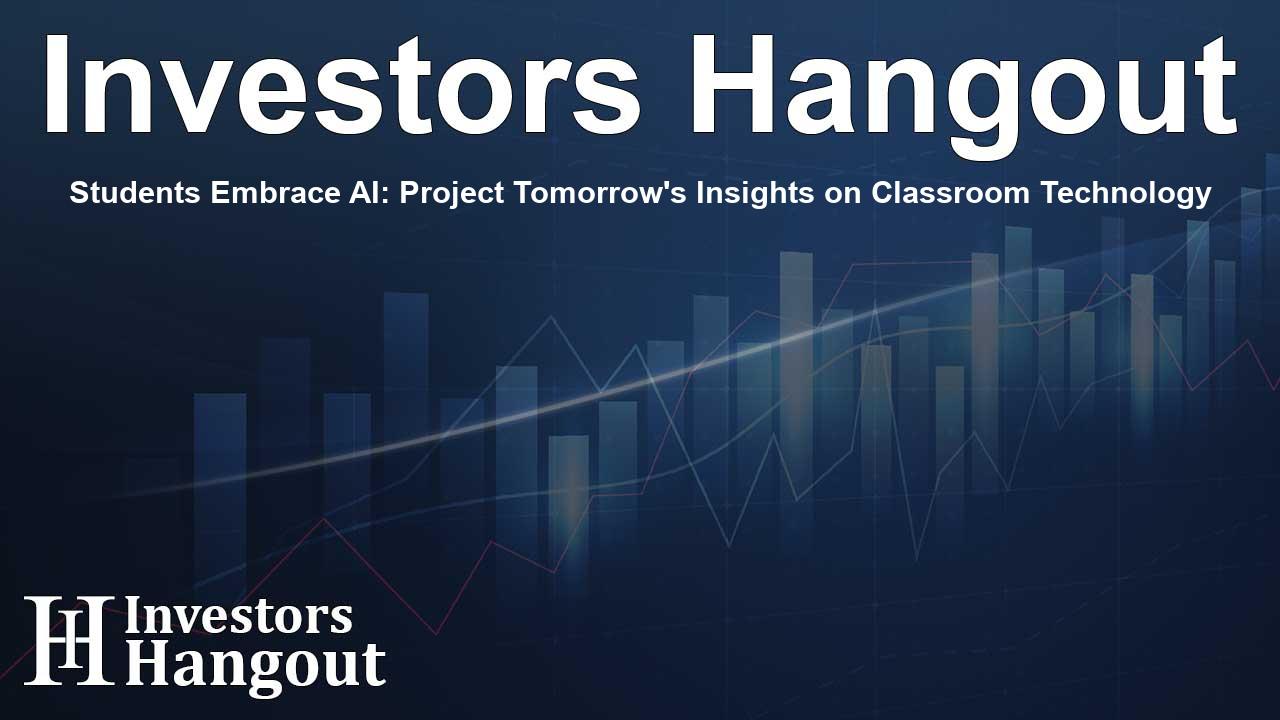Students Embrace AI: Project Tomorrow's Insights on Classroom Technology

Understanding the Rise of AI in Education
As technology evolves, so does the way we learn and teach. Project Tomorrow, a prominent nonprofit dedicated to educational advancement, has recently unveiled its annual report on the integration of technology, particularly artificial intelligence (AI), in the classroom. This enlightening report draws from the perspectives of K-12 students, educators, administrators, and parents, showcasing the urgent need for educational practices to align with the digital age.
Shifting Perspectives on AI in Learning
The findings from the recent report emphasize a significant trend – students are not just passive recipients of AI technology; they are actively engaging with it outside school, often experimenting independently. Nearly half of high school students report regularly using AI tools for personal learning, yet the connection with their teachers remains lacking. Only 18% of educators have inquired about students' personal AI usage, indicating a gap in communication. This disparity points to an urgent need for meaningful dialogue between students and teachers regarding AI's role in their academic lives.
Concerns Over AI Misuse
Despite students’ enthusiasm, concerns linger around the potential misapplication of AI in learning environments. A striking 63% of middle and high school students express fears of being wrongfully accused of cheating due to their AI usage. This highlights a disconnect between student experiences and educator perceptions of cheating, necessitating a collaborative approach to establish a shared understanding of AI’s implications in education.
The Urgency for Teacher Training
The report also underscores a critical issue in teacher preparation. Only 13% of educators feel confident utilizing AI tools, and 15% indicate their districts provide adequate training. This lack of confidence poses a barrier to effective AI integration in classrooms. As schools struggle to keep pace with technological advancements, there is a pressing opportunity for districts to invest in comprehensive professional development programs that will equip educators with the necessary skills to leverage AI effectively.
Parental Perspectives on AI in Education
Parents also play a pivotal role in the ongoing discussion about technology in schooling. A notable 74% believe that AI is essential for ensuring students are prepared for college and careers, although only 22% feel knowledgeable about Gen AI tools. This gap in understanding points to the need for more engagement and education for parents regarding the technologies that influence their children's learning experiences.
Students' Aspirations for AI Integration
Looking ahead, students have clear aspirations for the role of AI in their education. The recent survey reveals their hopes that AI can enhance their learning experiences, increase engagement, and better prepare them for future opportunities. However, realizing these aspirations requires collective effort from educators, policymakers, and parents alike to ensure AI is applied ethically and effectively within educational frameworks.
Driving Change Through Collaboration
Project Tomorrow's report emphasizes the urgency for K-12 education systems to clarify ethical guidelines for AI utilization. Dr. Julie Evans, CEO of Project Tomorrow, advocates for consensus and collaboration among educators, students, and parents. Together, they can develop clear roadmaps that stipulate appropriate uses of AI, fostering an environment where technology enhances education without compromising integrity or fairness.
Final Thoughts on AI in K-12 Education
The dialogue surrounding AI in education is more critical than ever. As both students and educators navigate this swiftly changing landscape, the insights from Project Tomorrow's report provide a vital foundation for developing policies that resonate with the needs and expectations of all stakeholders. By centering discussions around student experiences and fostering an inclusive environment for feedback, educational institutions can create more innovative and effective learning experiences.
Frequently Asked Questions
What does Project Tomorrow's report focus on?
The report highlights the integration of AI in K-12 education and emphasizes the importance of aligning educational practices with current technology trends based on student and teacher feedback.
How are students using AI outside the classroom?
Many students use AI tools regularly to enhance their self-directed learning, reflecting their initiative to explore technology independently.
What concerns do students have about AI in education?
Students worry about being unfairly accused of cheating due to their use of AI tools, indicating a need for clearer definitions of academic integrity concerning AI.
What do educators think about AI?
Many educators feel unprepared to integrate AI into their teaching practices, emphasizing the necessity for more professional development and training in this area.
Why is parental involvement important in AI discussions?
Parental engagement is crucial as it can influence educational policies and support students' learning journeys, particularly as they navigate new technologies like AI.
About The Author
Contact Lucas Young privately here. Or send an email with ATTN: Lucas Young as the subject to contact@investorshangout.com.
About Investors Hangout
Investors Hangout is a leading online stock forum for financial discussion and learning, offering a wide range of free tools and resources. It draws in traders of all levels, who exchange market knowledge, investigate trading tactics, and keep an eye on industry developments in real time. Featuring financial articles, stock message boards, quotes, charts, company profiles, and live news updates. Through cooperative learning and a wealth of informational resources, it helps users from novices creating their first portfolios to experts honing their techniques. Join Investors Hangout today: https://investorshangout.com/
The content of this article is based on factual, publicly available information and does not represent legal, financial, or investment advice. Investors Hangout does not offer financial advice, and the author is not a licensed financial advisor. Consult a qualified advisor before making any financial or investment decisions based on this article. This article should not be considered advice to purchase, sell, or hold any securities or other investments. If any of the material provided here is inaccurate, please contact us for corrections.
